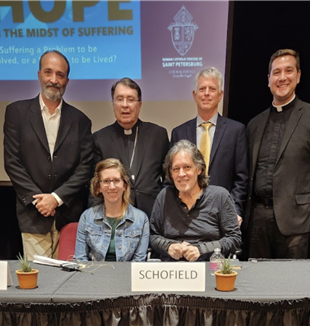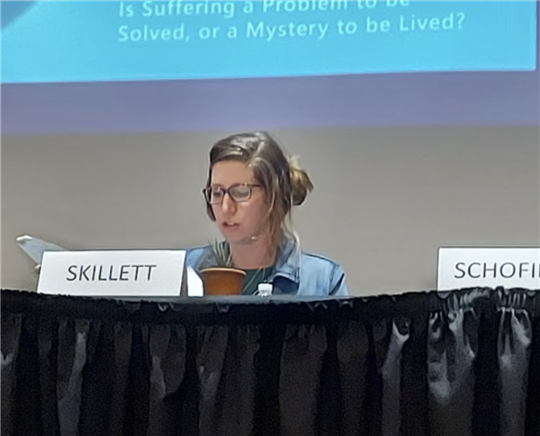
The World as Parable
Invited to share her experience of suffering at Encounter Tampa Bay, Kathryn finds herself “moved by the parable” given to herWhen my husband and I lost our third child at 17 weeks gestation last Easter, I felt depressed and desolate. My longing for meaning after such a devastating loss moved me to propose Cry of the Heart by Monsignor Lorenzo Albacete to my community. On the night of our discussion I hoped my friends, whose accompaniment comforted and supported me during the difficult pregnancy, would say just the right words to me and unlock the secret to suffering well. Maybe then it wouldn’t be so hard! That night, we mourned the loss of Baby Samantha together. We spoke about co-suffering, which is Monsignor Albacete’s term for accompanying a person without needing to fix their situation or explain away their burdens. This discussion led me to discover that my friends had no desire to cheapen my experience of loss by teaching me a lesson or showing me a silver lining. Instead, they invited me to remain with my suffering, with my eyes wide open, and expect to meet Christ in the darkness.
After I wrote about our evening and submitted my reflection to this newsletter, Joe from Florida invited me to give a witness about Cry of the Heart at the Encounter Tampa Bay. Leading up to the event, I attended weekly Zoom meetings with the Florida community to discuss the text. The vulnerability and sincerity the participants brought to the calls helped me to forge friendships, and those friendships gave me courage to face this unprecedented event in my life: flying across the country to give a public witness about an exceedingly painful experience to an auditorium full of people, including the Apostolic Nuncio. However, I still was not prepared for the embrace I received from Joe, the other panelists Enrico and Leo, and the community members I had the privilege to meet.
It seems odd, but I wish to quote late night talk-show host Stephen Colbert, who said during an interview as he was talking about the death of his mother and his brother, “I am grateful for the thing I wish hadn't happened.” Monsignor Albacete also expressed this same paradoxical sentiment with the simple phrase, “In spite of everything, thank you God.”
Our miscarriage has undeniably set me on a path to deeper communion with the Lord. I regret my daughter’s death! But I have gratitude for the work Christ has achieved in my heart – work that began with grief and darkness. I wouldn’t call this optimism or a desperate reach for a silver lining. This is recognition of reality, calling a spade a spade. The work of binding up the wounds of my heart (also aided by Well-Read Mom and Isaac Wicker’s Known: Embraced by the Heart of the Father program) came to a dramatic climax in my trip to Florida, almost a year after the miscarriage. Because of my experience of suffering, I went to Tampa and I met great friends. Our brief time together included discussions of deeply personal suffering. I have no wisdom to remark on this except to say in amazement that we would not have been together to embrace each other and laugh, eat, sing, and celebrate the Eucharist if not for our experiences of suffering and our plea in front of Mystery to help us make sense of the events of our lives! So I am! I am grateful for the thing I wish hadn’t happened!
I brought my experience in Florida to School of Community the next week. When reading Chapter 12 of The Religious Sense I was compelled to look back on the year. I was able to “back off three meters” and I “saw the painting in its unity, in its entire perspective and said, ‘Oh, now I understand! How beautiful!’” (The Religious Sense, page 129). I told my friends, as we discussed the world as parable: in watching my son and daughter play hide and seek with their father, I was moved by the parable given to me. A girl loses sight of her father whose presence, when in plain sight, can be taken for granted and easily ignored. She starts to look for him and after a few minutes her eagerness reaches a new height, bordering on panic. She asks him to whistle, as a hint of his whereabouts. She can’t rest until he is found, she can’t forget him or be distracted from her search. She even calls for her brother and her mother to help her. And when at last he is found, both father and daughter are delighted and they embrace, laughing. Next, does she want to stop the game and go to bed? No. “Let’s play again!” she begs.
An experience of suffering led to an encounter with Him. It’s been so uplifting and satisfying that I feel like the little girl who wants to play again! This frightens me too, but my desire for Him to show me more is greater than fear!
Kathryn, Omaha, NE